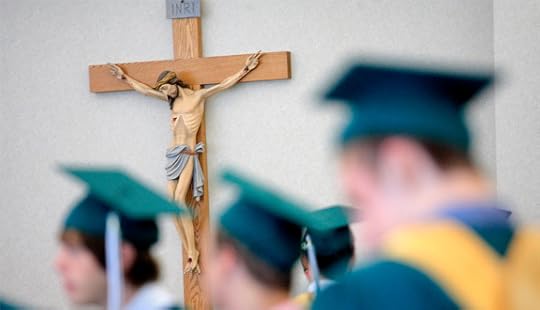Why College?

(CNS photo/Don Blake, The Dialog)
Why College? | Fr. James V. Schall, SJ | Catholic World Report
There are many reasons given for higher education, but how many of them take seriously ultimate questions and the permanent things?
The question—“Why college?”—lends itself to numerous, often amusing, answers: Colleges are designed to keep millions of youth off the labor market. Colleges are preparations for jobs. Colleges are funded country clubs that provide housing, board, games, social life, and delight during the least easily manageable period of human life. Colleges are run by political states to indoctrinate the young in the ideology of its (the state’s) choice. Colleges are set apart from politics wherein what is not political can be freely discussed. Colleges are places where we learn how to “research” things. Colleges are places where we develop new ideas. Colleges are places where we keep old ideas. Colleges are places where we defend silly ideas. Colleges are hi-tech training grounds wherein the future is anticipated. Colleges are degree-giving institutions mandatory for everyone. Colleges are places where professors are free to think whatever they want. Colleges are places designed for the benefit of their administrators. Colleges are all of the above. Colleges are none of the above.
Samuel Johnson, the mere reading of whom is a college education by itself, appears to have not completed his stay at Pembroke College, Oxford. He said, however, that the best thing we could do for a boy was “to teach him how to read.” The only addendum we might attach to that excellent advice is a recollection of C. S. Lewis. He relates that he grew up in a home in which there were many basic books and not much else to do in Belfast but read them. This advice about reading makes us wonder about the famous aphorism—“All work and no play makes Jack a dull boy.” I believe Lewis was called “Jack,” though I doubt that this admonition applied to him.
It does make us wonder what place “play” has in college. I do think that drama, music, and sports—both playing in them and watching them—have a place in college. Indeed, they may have a more central purpose than we are usually wont to assign to them. Things are taught on the playing fields of Eton that few professors know about unless they also played in their youth.
We may, in fact, live in a culture in which exists very few real “colleges” to which we might apply or attend.
Carl E. Olson's Blog
- Carl E. Olson's profile
- 20 followers



